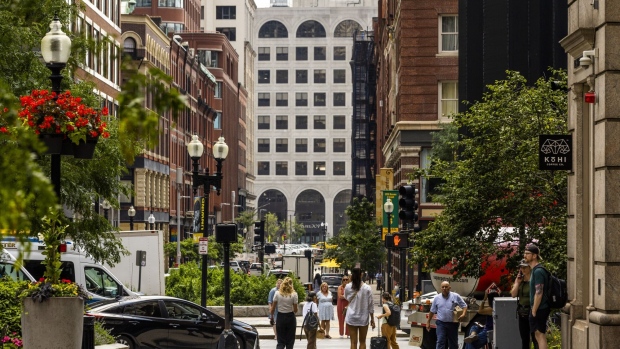Feb 15, 2024
Boston Faces $1 Billion Tax Deficit From Faltering Office Market
, Bloomberg News

(Bloomberg) -- Tumbling market values for office buildings are poised to cost Boston more than $1 billion in tax revenue over the next five years, as the pitfalls of the pandemic and hybrid work continue to reverberate through city budgets.
That’s according to a new analysis published Thursday from Tufts University’s Center for State Policy Analysis and the nonprofit Boston Policy Institute. The findings are based in part on a McKinsey & Co. estimate that office values will drop by 30% or more through the end of the decade. Boston has an overreliance on commercial property taxes.
The persistence of Covid-era remote work policies and higher interest rates has eroded demand for offices across the country, particularly for older buildings and those in less desirable areas. About 15.8% of downtown office space in Boston was vacant in the fourth quarter of 2023, more than double the pre-pandemic rate, according to data from CBRE Group Inc.
While Boston’s office vacancy rate is among the lowest of major US markets thanks to strong employment and a diverse mix of industries, its tax system makes it uniquely vulnerable to dwindling commercial real estate values compared to other cities.
More than a third of the city’s tax revenue is linked to the commercial property market, according to the report. By comparison, Chicago, Miami, New York and Washington, derive between 5% and 15% of their revenue from such taxes — partly because these metropolises are able to bolster their budgets with local sales and income taxes, which Massachusetts largely prohibits at the local level.
Governor Maura Healey has proposed an increase in the taxes cities and towns can charge for hotel rooms, meals and locally-registered vehicles but this may not be enough to offset the drag from commercial property, the report said. To fully fill the potential hole, Boston would have to raise taxes on residents by as much as 30%.
Boston Mayor Michelle Wu in July announced tax breaks meant to encourage property developers to convert office space into housing. The city taxes residential properties at a much lower rate and under the program, developers would be subject to that levy, with discounts of as much as 75% added as extra sweeteners.
While that may help fill empty office space and ease the city’s housing shortage, it won’t help tax revenue. Commercial properties are taxed at a rate of about 2.5%, compared with around 1.1% for residences, according to the Tufts and Boston Policy Institute report. Under the current system, an office building is much more valuable to the city from a tax perspective than an apartment complex.
Property taxes are based on assessed values, rather than market rates, so the strain on Boston’s tax base may build gradually. Still, without a meaningful uptick in office demand, the city is on track for an annual collection shortfall of roughly $500 million starting in 2029, around 10% of total revenues, the report said. At the state level, Massachusetts tax revenues have missed budget forecasts for seven straight months through January.
©2024 Bloomberg L.P.





